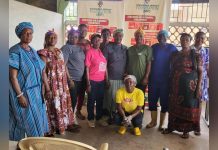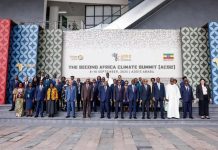Africa-Press – Ghana. Accra, Nov. 19, GNA – Madam Abena Annobea Asare, a Director at the Human Trafficking Secretariat of the Ministry of Gender, Children and Social Protection, says child labour is still endemic on the Volta Lake.
She said despite the collaborative efforts from the Child Labour Unit of the Ministry, Anti-Human Trafficking Unit of the Ghana Police Service, and other stakeholders, 20 per cent of children labourers were rescued from the Volta Lake.
Madam Asare was speaking at the opening of a two-day workshop in Accra on building a sustainable protection network to eliminate child labour as a result of human trafficking on the Volta Lake.
The workshop was part of a project implementation by the Labour Department, in collaboration with the Network for Community Planning and Development (NECPAD) and its partners. The project is a 30-month intervention, dubbed: The Sustainable Nets Project.”
She said the fishing sector was one of the main areas of child labour and exploitation, which came in the form of trafficked, forced into labour or bondage, and even work in hazardous conditions under the purpose of exploitation.
From 2017 to 2020, there had been 1,917 victims of human trafficking and labour cases recorded. A total of 997 of these victims are children, whilst 920 were adults.
Similarly, 1,040 are victims of labour exploitation as 151 fell prey to sex abuses. Madam Asare said Ghanaians involved were 1,427 with other nationals totaling 489, with the number comprising 979 females and 938 males.
“Trafficking is an organised crime and must be fought by a well-organised agency,” she said.
“We must continue to work together, work as a team so that our efforts will be greater than the traffickers.”
“The 1992 Constitution, The Children’s Act, 1998 (Act 560), The Human Trafficking Act, 2005 (Act 694) and some other policies and regulations protect the interest of children, but traffickers somehow have not relented on their illegality.”
Madam Asare said the perpetrators used deception, offer juicy agreement to parents when the purpose was to be exploitative, adding that some of the signs associated with the victims were bruises, cuts, poor living conditions, and depression.
All the rescued victims had been rehabilitated and reintegrated with their families and a session of them had been engaged in apprenticeship whilst others were in school, she said.
Chief Superintendent Michael Baah, the Head of the Anti-Human Trafficking Unit of Criminal Investigations Department, said the prosecution had led to 44 convictions between 2018 to date. Also, hundreds of victims had been rescued with 556 investigations between 2016 and 2020.
He said it was the responsibility of every citizen, particularly agencies mandated by law to protect the children, to give them a better future to save them from becoming miscreants to torment the very society that shirked its responsibility.
The Ghana Police Service, since 2015, introduced a child-friendly policing programme into its mainstream policing, with the idea being to empower officers with skills to engage and rescue children in a friendly manner.
Mr Paul Asamoah Kukwaw, the Director for NECPAD, said the Network targeted rescuing between 60 and 120 children with a rollout of a sustainable livelihood scheme to put them into apprenticeship training. He pledged his organisation’s commitment to work in unison with all stakeholders to rescue, rehabilitate and reintegrate victims.
For More News And Analysis About Ghana Follow Africa-Press







